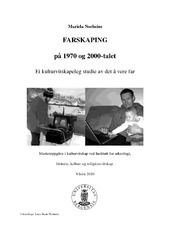| dc.contributor.author | Norheim, Mariela | eng |
| dc.date.accessioned | 2010-09-13T11:45:21Z | |
| dc.date.available | 2010-09-13T11:45:21Z | |
| dc.date.issued | 2010-05-17 | eng |
| dc.date.submitted | 2010-05-17 | eng |
| dc.identifier.uri | https://hdl.handle.net/1956/4156 | |
| dc.description.abstract | I samband med samtida sitt fokus på fedrar har det for meg vore aktuelt å sjå nærare på kva det vil seie å utforma sin identitet som far. Denne studien tek for seg på kva måte fedrar med små born fortel om det å vera far på 1970- og 2000-talet og vidare kva offentleg omtale fedrar får i aviser innanfor desse årgangane. Avisene som er analysert i oppgåva synar konteksten for dei to generasjonane gjennom deira framstillingar av offentleg samtale om fedrar. I oppgåva er det analysert intervju med 8 informantar der eg har vore oppteken av korleis dei set ord på deira relasjon til eigne fedrar og til eigne born. Omgrepa og analyseperspektiva er henta frå kjønnsteori og nyttast for å løfte fram fedrane sine ulike fokus i samtalane. Analysane i oppgåva synar endringar mellom 1970- og 2000-talet med omsyn til korleis fedrane vel å fortelje om dei nemnde relasjonane, og i tillegg nokre ulikskapar innanfor kvar av generasjonane. I alt kan ein sjå variasjonar av forteljingar som peikar mot tilhøvet mellom ein nær farsidentitet og ein farsidentitet som primært knyttast til å verne om borna. | en_US |
| dc.description.abstract | In relation with the present focus on fatherhood, it has been relevant for me to have a closer study of the meaning of shaping ones identity as a father. This study explores the ways in which fathers of young children narrate about being a father during the 1970´s and 2000´s as well as the public status of fathers in the newspapers throughout these two different decades. The analyzed newspapers set the context for the two generations through their portrayals of public discussions about fathers. 8 interviews have been conducted and analyzed for this research in which I have focused on how they describe their relationships to their own fathers, and their own children. The framework and perspectives of analysis are derived from gender theory and utilized to expose the different focuses of the fathers during the interviews. The analysis of the research shows the changes between 1970´s and 2000´s in relation to how the fathers chose to speak about the above mentioned relationships, and in addition some of the differences within each of the generations. Overall the shown variations of stories told, points towards a connection between a close father identity and a father identity primarily concerned about providing for the children. | en_US |
| dc.format.extent | 3062225 bytes | eng |
| dc.format.mimetype | application/pdf | eng |
| dc.language.iso | nno | eng |
| dc.publisher | The University of Bergen | eng |
| dc.subject | Farsidentitet | nob |
| dc.subject | Kjønnsperspektiv | nob |
| dc.subject | Offentleg omtale | nob |
| dc.subject | Forteljingar | nob |
| dc.subject | Endring | nob |
| dc.title | Farskaping på 1970 og 2000-talet - ei kulturvitskapeleg studie av det å vere far | nob |
| dc.type | Master thesis | |
| dc.rights.holder | Copyright the author. All rights reserved | |
| dc.rights.holder | The author | eng |
| dc.description.degree | Master i Kulturvitenskap | |
| dc.description.localcode | MAHF-KUVI | |
| dc.description.localcode | KUVI350 | |
| dc.subject.nus | 713412 | eng |
| dc.subject.nsi | VDP::Humaniora: 000::Kulturvitenskap: 060::Nordisk kulturvitenskap: 061 | |
| fs.subjectcode | KUVI350 | |
